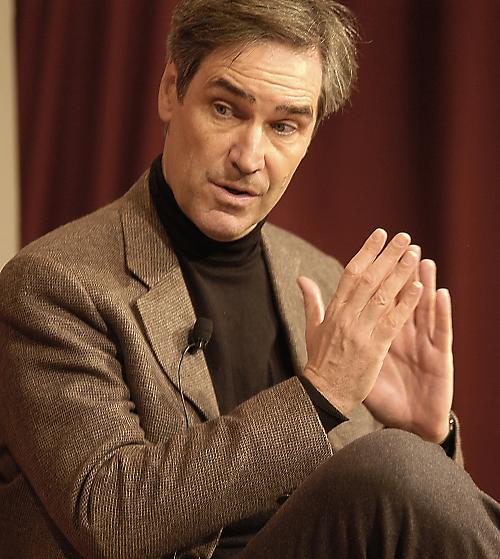
News
Summers Will Not Finish Semester of Teaching as Harvard Investigates Epstein Ties

News
Harvard College Students Report Favoring Divestment from Israel in HUA Survey

News
‘He Should Resign’: Harvard Undergrads Take Hard Line Against Summers Over Epstein Scandal

News
Harvard To Launch New Investigation Into Epstein’s Ties to Summers, Other University Affiliates

News
Harvard Students To Vote on Divestment From Israel in Inaugural HUA Election Survey
Before Campaigning, Ignatieff Talks Rights

Two weeks after announcing his candidacy for the Canadian Parliament,
Harvard professor Michael G. Ignatieff outlined the most pressing
issues in human rights in an appearance at the John F. Kennedy Jr.
Forum yesterday, touching on topics ranging from international
development to the Iraq war.
Ignatieff, who is about to begin campaigning full-time in Canada as a
Liberal Party candidate, is currently on leave from his position as
director of the Kennedy School of Government’s Carr Center for Human
Rights. He has spent this semester as the Jackman visiting professor in
human rights policy at the University of Toronto in Canada.
At yesterday’s forum, “Human Rights: Where the Action Is,” Kennedy
School Dean David T. Ellwood ’75 interviewed Ignatieff before a large
audience.
Ignatieff said the focus in human rights has shifted from drafting
international conventions at the United Nations to protecting economic
and social rights in developing countries.
“The action is in the [non-governmental organization] community, it’s
in the [World Trade Organization], it’s in Oxfam leading four West
African countries to challenge U.S. cotton subsidies,” Ignatieff said.
“The future of human rights is in economic and social rights and in the
debate between the north and south, the developing and the developed
world, over the responsibilities of rich countries to poor countries.”
According to Ignatieff, migration is an especially explosive area, since every country regulates it differently.
“This is the hottest zone, the most troubling zone, the most lawless zone, of international human rights,” he said.
The discussion then shifted to Ignatieff’s controversial use of human rights considerations to justify military intervention.
Ignatieff said he believes the test for when to intervene has two
parts. The country must be a “human rights disaster,” and it must also
pose a threat to international peace and security.
Ignatieff said that Iraq, based on the available intelligence,
fulfilled both of these requirements, and he supported President Bush’s
invasion. The problem, he said, was that there was not an adequate plan
for the aftermath. Ignatieff has received criticism in Canada for this
stance on Iraq, which differs from the mainstream view of the Liberal
Party.
Many of the audience members’ questions focused on Ignatieff’s doctrine of intervention.
Ignatieff said that Zimbabwe has committed human rights violations and
could have a destabilizing effect on the surrounding region, making it
a candidate for intervention. On the other hand, he said, military
intervention would not be feasible in North Korea or Iran, but
multi-lateral engagement could be effective in Iran.
Ignatieff said that Republican foreign policy, focusing on promoting
democracy, is better suited to the situation in the Middle East than
what he termed the cautious, pragmatic neo-isolationism offered by the
Democrats. “The times require real vision in the Middle East,” he said.
Flavio S. Campos ’08, a government concentrator, said he appreciated
that Ignatieff attempted to find a balanced view of international
relations.
“It was very interesting to see that he’s a guy who goes for
compromise, that here’s someone that’s really ready to listen to other
people,” he said. “It’s good to know that the people who are telling us
to run for office are taking their own advice.”
Ignatieff sparked controversy in Canada earlier this month after he
told The Crimson he might try to return to Harvard if he lost the
election. He told Canada’s Globe and Mail newspaper that the comment
was a joke and that he would continue teaching at the Unversity of
Toronto if he lost. He later told The Crimson that “it would be an
honor” to come back to Harvard in the future, but only when his
political career ends.
Want to keep up with breaking news? Subscribe to our email newsletter.
